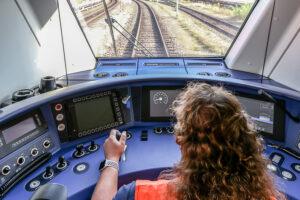1 of 8 – What Non-Technical Skills (NTS) are most important to safe train driving?
For a number of years the Occupational Psychology Centre (OPC) psychologists have been working alongside International and UK rail clients developing a more in-depth understanding of NTS and how they can help improve safety.
Dr Stephen Fletcher, occupational psychologist and director at the OPC, has written the first in a series of eight articles about NTS and how it can build a safer rail network through the use of them. The series aims to cover a brief overview, the implications of NTS shortfalls and safety incidents; the value and benefit of understanding NTS when exploring safety incidents through to individual application of NTS in various railway jobs.
Alongside these articles the OPC will be running a number of complimentary Webinars available to all in the industry, the first of which is on November 11th with forthcoming dates to be published soon.
Overview
Non-Technical Skills (NTS) can be described as those personal characteristics that you and I bring to our work roles that help us to be safe, effective and efficient. These NTS can include our abilities, personality, interpersonal skills and our motivations.
Key research identifies 26 Non-Technical Skills for train drivers
In 2012 the Railway Safety and Standards Board (RSSB) published some key work research that identified 26 NTS for train drivers. These NTS were categorised under seven headings, including but not limited, to situational awareness, communication and workload management. Many UK train and freight operators have now incorporated NTS into their driver operations and are actively using NTS to improve driver effectiveness.
OPC psychologists work to identify what Non-Technical Skills are most important to train driving?
Having 26 NTS that we expect our train drivers to possess and live out in their day-to-day driving is a positive development for our industry. However, a key question often posed by our rail clients is: What NTS are the most important to train driving and which should we focus on with our drivers?
To answer this question OPC psychologist asked 81 train driver experts (driver managers, trainers and instructors) from 4 leading UK train operators (commuter and long distance) to rate the importance of the 26 NTS to train driving. We analysed the data and ranked the NTS in order of importance to safe train driving. The results are displayed below:
Non-Technical Skills ranked order of importance to safe train driving

Based on research published by the RSSB 2012 ‘Research Programme. Operations and Management. Non-technical skills for rail: A list of skills and behavioural markers for drivers, with guidance notes.’ Copyright RSSB 2012
The OPC’s research amongst train driver experts indicated that the most crucial NTS’s were some very important ones (highlighted in blue) such as maintaining concentration, anticipating risk and having an overall awareness of situations and surroundings – these are key NTS to keep a driver, the onboard team and passengers all safe.
Putting the top NTS to effective use
Many OPC rail clients have selected and focused on their own most important NTS to deliver in depth NTS training for their drivers and driver managers, depending on the type of driving, traction and/or the business priorities. One rail client trained all their train drivers in their top 3 NTS including maintaining concentration, attention to detail and the anticipation of risk. Another rail client trained over 1,000 train drivers in their top 6 NTS, with positive feedback from the managers and drivers alike.
Dr Steve Fletcher psychologist and director at the OPC said: “At the OPC we have witnessed first-hand the positive impact NTS can have on an organisation’s safety performance, as well as at an individual level too. We are keen advocates of NTS, which is why we are eager to share the knowledge we have in this area and promote the benefits to influence a safer rail network for all.”
If you are interested in understanding more about how NTS can help drivers and other safety critical staff improve safety performance, do contact us at admin@theopc.co.uk or call +44 1923 234646.

Photo credit: iStock







































 0113 2082620
0113 2082620 info@railbusinessdaily.com
info@railbusinessdaily.com 15 Mariner Court, Wakefield WF4 3FL
15 Mariner Court, Wakefield WF4 3FL

